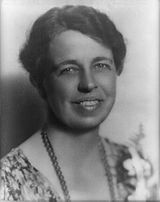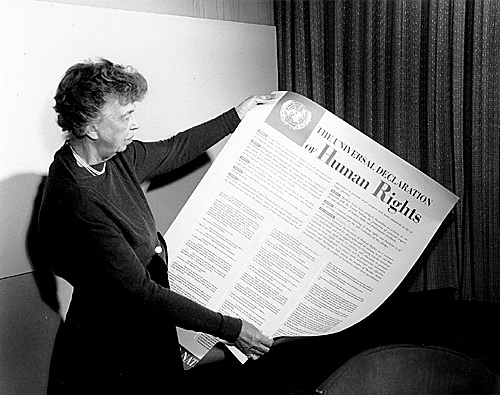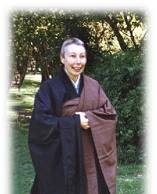Une femme admirable qui est à l’origine de la Déclaration Universelle des Droits Humains dont Amnesty a célèbré le soixantième anniversaire en décembre dernier.
 Première dame des Etats-Unis de 1933 à 1945, elle sera la première à y occuper un rôle actif.
Première dame des Etats-Unis de 1933 à 1945, elle sera la première à y occuper un rôle actif.
Elle aura d’abord contribué à l’élection de son mari à la présidence des Etats Unis. Elle pèsera sur la décision d’engager le pays dans la Seconde Guerre mondiale. Elle n’hésitera pas à rendre visite aux troupes sur le front.
Féministe engagée, elle s’opposera au racisme et défendra le Mouvement américain pour les droits civiques.
Après le conflit, elle joue un rôle déterminant dans la création de l’Organisation des Nations unies (ONU) puis, Franklin ayant disparu avant la fin de son dernier mandat, préside la commission chargée de rédiger la Déclaration universelle des droits humains (pendant la présidence de Harry S. Truman).
Ses nombreux voyages dans le monde et sa diplomatie contribuent de façon décisive à l’adoption de cette déclaration par l’Assemblée générale des Nations Unies 1948.
Grace à elle, pour la première fois dans un traité international, il est explicitement déclaré l’égalité entre les êtres humains, quel que soit leur sexe.
C’est elle qui lira cette déclaration, réellement universelle, à la tribune de l’Organisation des Nations unies.
Elle considérait cette déclaration comme l’achèvement suprême de sa vie.
Quelques-unes de ses paroles :
* « You have to accept whatever comes, and the only important thing is that you meet it with courage and with the best that you have to give. »
* « The future belongs to those who believe in the beauty of their dreams. »
* « No one can make you feel inferior without your consent. »
* « Do what you feel in your heart to be right — for you’ll be criticized anyway. You’ll be damned if you do, and damned if you don’t. »
* «The structure of the world peace cannot be the work of one human being, or one party or one nation. it must be a peace which reste on the cooperative effort of the whole world.»
« Where, after all, do universal human rights begin? In small places, close to home – so close and so small that they cannot be seen on any maps of the world. Yet they are the world of the individual person; the neighborhood he lives in; the school or college he attends; the factory, farm, or office where he works. Such are the places where every man, woman, and child seeks equal justice, equal opportunity, equal dignity without discrimination. Unless these rights have meaning there, they have little meaning anywhere. Without concerted citizen action to uphold them close to home, we shall look in vain for progress in the larger world. »
Eleanor Roosevelt

Eleanor Roosevelt on Human Rights:
Universal Declaration of Human Rights (December 10, 1948) United Nations. The Universal Declaration is the primary international articulation of the fundamental and inalienable rights of all members of the human family. It represents the first comprehensive agreement among nations as to the specific rights and freedoms of all human beings. The Declaration has become a cornerstone of customary international law, binding all governments to its principles.
Human Rights and Human Freedom: An American View (1946) Eleanor Roosevelt As a member of the United States delegation to the United Nations General Assembly, Mrs. Roosevelt debates Andrei Vishinsky, chief Soviet delegate, over the proposed amendment that no propaganda should be permitted in refugee camps against the interests of the United Nations or its members. The success of her argument, based on the idea that such an amendment would violate human rights by restricting freedom of speech and expression, strengthened Mrs. Roosevelt’s position as a leading voice in the international defense of human rights.
The Promise of Human Rights (April 1948) Eleanor Roosevelt. This article, from the journal Foreign Affairs, provides a brief history of the Commission on Human Rights and its efforts to write a draft international Bill of Human Rights, including a Declaration and a Convention. Mrs. Roosevelt discusses both documents, including the articles she thinks are of vital importance, and her views on the Commission’s work in general.
Making Human Rights Come Alive (1949) Eleanor Roosevelt. This speech to the Second National Conference on UNESCO reflects on the Universal Declaration and the problems that had to be overcome in writing a truly international document. Mrs. Roosevelt cites the difficulties in searching for appropriate wording and precedents in law and especially in bridging the gaps between cultures.
Statement on Draft Covenant on Human Rights (1951) Eleanor Roosevelt. The American delegation proposes that the Draft Covenant be divided into two separate documents of equal importance to be considered for adoption simultaneously; one for civil and political rights and the other for economic, social, and cultural rights. Mrs. Roosevelt argues that differences in terms of the time, methods and machinery needed to implement the various provisions make such a division a practical step.
On the Draft Convention on Political Rights of Women (1953) Eleanor Roosevelt. Discussing the specific articles of the Convention, Mrs. Roosevelt argues that the objectives of the United Nations are not only to encourage equal political rights for women in all countries, but also to ensure that women fully participate in directing the policy making of their governments.
In Your Hands (March 27, 1958) Eleanor Roosevelt. Presenting a « guide to community action » on the eve of the Universal Declaration’s Tenth Anniversary, Mrs. Roosevelt declares that « the destiny of human rights is in the hands of all our citizens in all our communities. » She urges people to improve human rights conditions « in small places, close to home » as the first step towards global progress.
Adoption of the Declaration of Human Rights (December 9, 1948) Eleanor Roosevelt.
Source : Site UDHR (Universal Declation of Human Rights)







